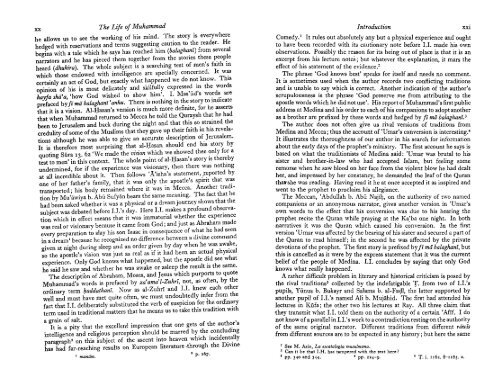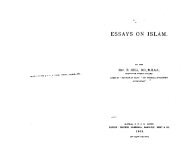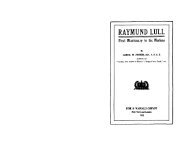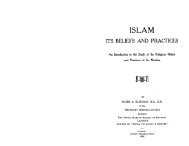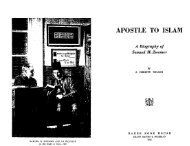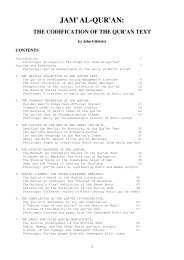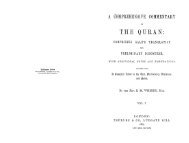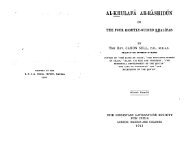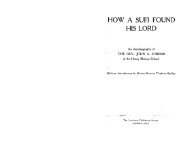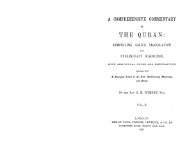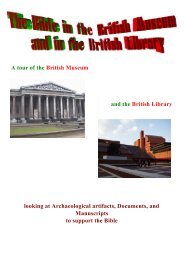Guillaume--Life of Muhammad.pdf - Radical Truth
Guillaume--Life of Muhammad.pdf - Radical Truth
Guillaume--Life of Muhammad.pdf - Radical Truth
Create successful ePaper yourself
Turn your PDF publications into a flip-book with our unique Google optimized e-Paper software.
xx<br />
The <strong>Life</strong> <strong>of</strong> <strong>Muhammad</strong><br />
he allows uS to see the working <strong>of</strong> his mind. The story is everywhere<br />
hedged with reservations and terms suggesting caution to the reader. He<br />
begins with a tale which he says has reached him (balaghani) from several<br />
narrators and he has pieced them together from the stories these people<br />
heard (dhukira). The whole subject is a searching test <strong>of</strong> men's faith in<br />
which those endowed with intelligence are specially concerned. It was<br />
certainly an act <strong>of</strong> God, but exactly what happened we do not know. This<br />
opinion <strong>of</strong> his is most delicately and skilfully expressed in the words<br />
kayla sM'a, 'how God wished to show him'. I. Mas'lid's words are<br />
prefaced byfi mii balaghani'anhu. There is nothing in the story to indicate<br />
that it is a vision. AI-J:Iasan's version is much more definite, for he asserts<br />
that when <strong>Muhammad</strong> returned to Mecca he told the Quraysh that he had<br />
been to Jerusalem and back during the night and that this so strained the<br />
credulity <strong>of</strong> some <strong>of</strong> the Muslims that they gave up their faith in his revelations<br />
although he was able to give an accurate description <strong>of</strong> Jerusalem.<br />
It is therefore most surprising that al-J:Iasan should end his story by<br />
quoting Sura '3. 62 'We made the vision which we showed thee only for a<br />
test to men' in this context. The whole point <strong>of</strong> aI-l;Iasan's story is thereby<br />
undermined, for if the experience was visionary, then there was nothing<br />
at all incredible about it. Then follows 'Nisha's statement, _reported by<br />
one <strong>of</strong> her father's family> that it was only the apostle's spirit that was<br />
transported; his body remained where it was in Mecca. Another tradition<br />
by Mu'awiya b. Abu Sufyan bears the same meaning. The fact that he<br />
had been asked whether it was a physical or a dream journey shows that the<br />
subject was debated before I.I.'s day. Here 1.1. makes a pr<strong>of</strong>ound observation<br />
which in effect means that it was immaterial whether the experience<br />
was real or visionary because it came from God; and just as Abraham made<br />
every preparation to slay his son Isaac in consequence <strong>of</strong> what he had seen<br />
in a dream I because he recognized no difference between a divine command<br />
given at night during sleep and an order given by day when he was awake,<br />
so the apostle's vision was just as real as if it had been an actual physical<br />
experience. Only God knows what happened, but the apostle did see what<br />
he said he sawand whether he was awake or asleep the result is the same.<br />
The description <strong>of</strong> Abraham, Moses, and Jesus which purports to quote<br />
<strong>Muhammad</strong>'s words is prefaced by za'ama'l-Zuhrf, not, as <strong>of</strong>ten, by the<br />
ordinary term J:zaddathani. Now as al-Zuhri and 1.1. knew each other<br />
well and must have met quite <strong>of</strong>ten, we must undoubtedly infer from the<br />
fact that 1.1. deliberately substituted the verb <strong>of</strong> suspicion for the ordinary<br />
term used in traditional matters that he means us to take this tradition with<br />
a grain <strong>of</strong> salt.<br />
It is a pity that the excellent impression that one gets <strong>of</strong> the author's<br />
intelligence and religious perception should be marred by the concluding<br />
paragraph' on this subject <strong>of</strong> the ascent into heaven which incidentally<br />
has bad far-reaching results on European literature .through the Divine<br />
I manam. ~ p. 26,7·<br />
Introduction<br />
Comedy.' It rules out absolutely any but a physical experience and ought<br />
to have been recorded with its cautionary note before I I d h'<br />
b . P' .. mae Isown<br />
o servatlOns. .ossIbly the re~son for its being out <strong>of</strong> place is that it is an<br />
excerpt fr~m hIS lecture notes; but whatever the explanation, it mars the<br />
effect <strong>of</strong>.hIS statement <strong>of</strong> the evidence. 2<br />
The phr~se 'God knows best' speaks for itself and needs no comment<br />
It IS. sometimes used when the author records two conflicting tradition~<br />
and IS unable to. say which is correct. Another indication <strong>of</strong> the author's<br />
scrupulousness I~ the p~rase 'Go,d preserve me from attributing to the<br />
apostle words whIch he dId not use. His report <strong>of</strong><strong>Muhammad</strong>'s first public<br />
address at MedlUa and his order to each <strong>of</strong> his companions to adopt another<br />
as a brother are prefixed by these. words a.nd hedged byfi mii balaghani. 3<br />
T~e author does not <strong>of</strong>ten gIve us nval versions <strong>of</strong> traditions from<br />
M~dma and Mecca; thus the account <strong>of</strong> 'Umar's conversion is interesting."<br />
It Illustrates the thoroughness <strong>of</strong> our author in his search for information<br />
about the early days <strong>of</strong> the prophet's ministry. The first account he says is<br />
based on what the t.radltlOnIsts <strong>of</strong> Medina said: 'Umar was brutal to his<br />
SIster and brother-lU-law who bad accepted Islam, but feeling some<br />
remorse ~hen he saw blood on her face from the violent blow he had dealt<br />
her, and Impress~d by her. constancy, he demanded tbe leaf <strong>of</strong> the Quran<br />
thafrshe was readmg. Havmg read it he at once accepted it as inspired and<br />
went to the prophet to proclaim his allegiance.<br />
The ~eccan, 'Abdullah b. Abu NajiJ:t, on the authority <strong>of</strong> two named<br />
compamons or an anonymous narrator, gives another version in 'Vmar's<br />
own words .to the effect that his conversion was due to his hearing the<br />
proph~t<br />
re?lte the Quran while praying at the Ka:ba one night. In both<br />
narr~tlv;s It was the Quran whIch caused his conversion. In the first<br />
verSIOn U mar was affected by the bearing <strong>of</strong> his sister and secured a part <strong>of</strong><br />
the Q.uran to read himself; in the second be was affected by the private<br />
de~otlOns <strong>of</strong> the prophet. The first story is prefixed byIi mii balaghani but<br />
thI~ IS cancelled as it were by the express statement that it was the cu;rent<br />
belIef <strong>of</strong> the people <strong>of</strong> Medina. 1.1. concludes by saying that only God<br />
knows what really happened.<br />
A ~ather dif.licult problem in literary and historical criticism is posed by<br />
the .rIval :radltlOns S collected by the indefatigable T. from two <strong>of</strong> I.I.'s<br />
pupl1s, Yun~s b. BU,kayr and Salama b. al-Fa


